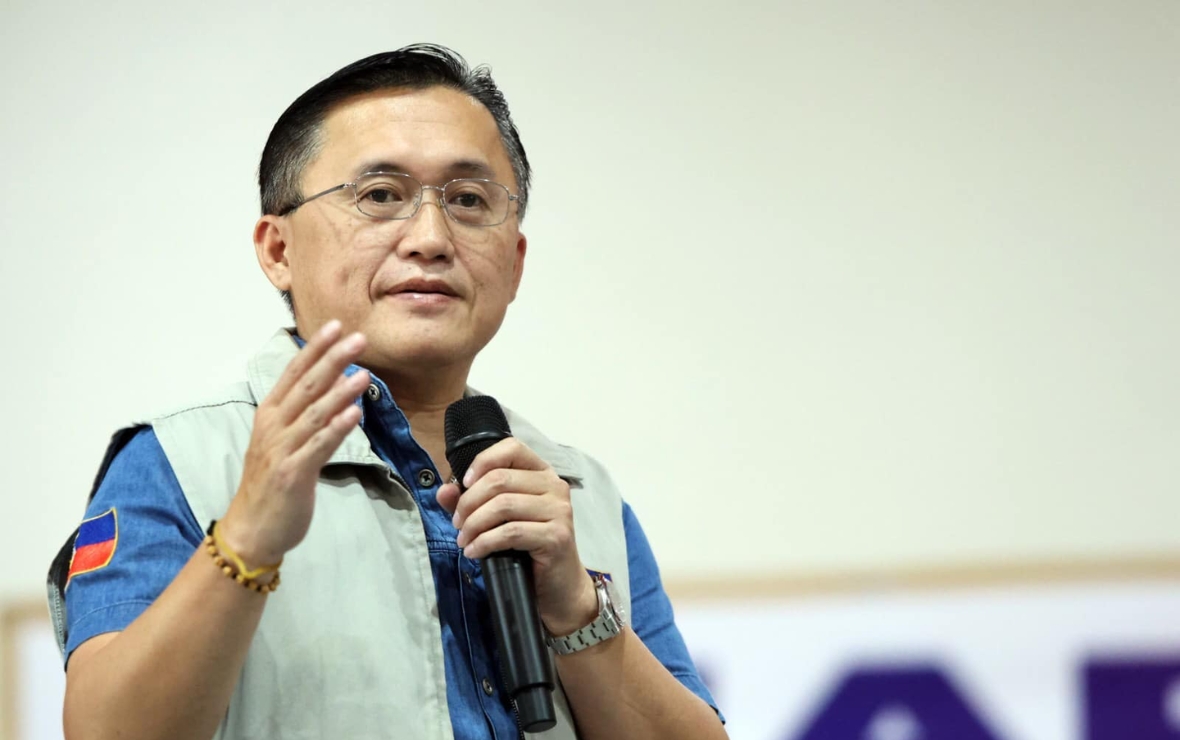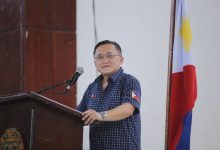SENATOR Christopher “Bong” Go personally led a relief activity for displaced workers in Quezon, Nueva Ecija, on Thursday, February 1, reaffirming his commitment to ensuring that ‘no Filipino is left behind’ in the nation’s march towards economic recovery.
Prior to the town’s celebration of its Patimyas Ani Festival, the senator, an adopted son of Nueva Ecija, provided aid to 354 displaced workers, each receiving food packs, vitamins, masks, and snacks. Select beneficiaries also received a bicycle, shoes, balls for basketball and volleyball, shirts, a watch, and a cell phone.
Meanwhile, the Department of Labor and Employment (DOLE) also conducted an orientation for qualified disadvantaged and displaced workers. It introduced them to the Tulong Panghanapbuhay sa Ating Disadvantaged/Displaced Workers (TUPAD) program, which aims to offer employment assistance in the near future.
“Sa pamamagitan ng programa na ito, ang gobyerno ay tumutulong sa mga manggagawang naapektuhan ng krisis at nakakapagbigay ng pansamantalang trabaho sa kanila,” Go said.
Go commended the DOLE for effectively implementing various assistance programs, such as TUPAD, which has significantly contributed to supporting individuals whose jobs have been impacted by crises. He likewise maintained his support, underscoring the importance of collaborative efforts in addressing the needs of the economically challenged community.
“Patuloy po tayong magtutulungan upang mas mapabuti pa ang kalagayan ng ating mga disadvantaged at displaced workers. Magkasama tayo sa layuning ito na makabuo ng mas ligtas at mas matatag na lipunan para sa lahat ng Pilipino,” he added.
In the Senate, Go filed Senate Bill No. 420 to promote further the welfare of Filipino workers affected by crises and ensure that those who reside in rural areas lacking job opportunities are taken care of, which seeks to offer temporary employment to eligible members of low-income rural households, who are ready to perform unskilled physical labor for some time.
Following the distribution activity, Go also visited the new dialysis center in the town which was advocated for by District Representative Mika Suansing. The Senator lauded such efforts to help improve healthcare access for the community.
Go then led the inauguration of the town’s new Legislative Building which he supported and advocated for to be funded as vice chairperson of the Senate Finance Committee to help in the development of the town and improve public service delivery and local governance.
Go was joined by Congresswoman Mika Suansing, Governor Aurelio Umali, Mayor Boyet Joson, Vice Mayor Dean Joson, and other local officials. The Senator also acknowledged the significant contributions of partner agencies and recognized the commitment and service provided by barangay officials whose grassroots leadership ensures the community’s needs are met effectively.
After his visit to Quezon, Go also went to Cuyapo town to help more indigents there in partnership with GP Partylist Rep. Jose Gay Padiernos.
“Tandaan po natin, isang beses lang tayo dadaan sa mundong ito. Kung ano pong kabutihan o tulong na pwede nating gawin sa ating kapwa ay gawin na po natin ngayon dahil hindi na po tayo babalik sa mundong ito,” he reminded them.
As chairperson of the Senate Committee on Health and Demography, Go urged residents to prioritize their well-being, encouraging them to seek the services of the Malasakit Centers in the province for medical-related assistance.
The Malasakit Centers Act, principally authored and sponsored by Go, simplifies access to medical assistance programs from various government agencies, including the Department of Health (DOH), Department of Social Welfare and Development, Philippine Health Insurance Corporation, and Philippine Charity Sweepstakes Office.
Malasakit Centers in the province are located at Eduardo L. Joson Memorial Hospital and Dr. Paulino J. Garcia Memorial Research and Medical Center (PJGMRMC) in Cabanatuan City and Talavera General Hospital in Talavera town.
“Nung unang panahon, marami sa mga kababayan natin ang kinakailangang pang lumabas ng ospital at pumila sa iba’t ibang ahensya ng gobyerno para humingi ng tulong. Ubos na panahon nila, ubos pa ang pera nila sa pamasahe. Ngayon, hindi na nila kailangang gawin ‘yan. Kung may billing kayo sa ospital, puntahan niyo lang ang Malasakit Center at tutulungan kayo nito,” he added.
According to DOH, 159 operational centers have helped more or less ten million Filipinos nationwide.
Go also mentioned his ongoing advocacy for the creation of Super Health Centers across the country, saying, “Makatutulong po ito sa mga kababayan natin na ilapit po ang serbisyong medikal sa kanila. Ilalagay po ito sa mga strategic areas sa buong Pilipinas.”
Super Health Centers are medium versions of a polyclinic and an improved version of the rural health unit that offer a range of services, such as database management, out-patient, birthing, isolation, diagnostic (laboratory: x-ray and ultrasound), pharmacy, and ambulatory surgical unit. Other available services are eye, ear, nose, and throat (EENT) service, oncology centers, physical therapy and rehabilitation centers, and telemedicine, making remote patient diagnosis and treatment possible.
Through the collective efforts of fellow lawmakers, local government units, and DOH led by Secretary Teodoro Herbosa, sufficient funds have been allocated for more than 700 Super Health Centers from 2022 to 2024.
DOH, the lead implementing agency, identifies the strategic areas where they will be constructed. In Nueva Ecija, nine Super Health Centers have been funded.
Finally, Go also principally sponsored and is one of the authors of the Republic Act No. 11959, also known as the Regional Specialty Centers Act, which was recently signed into law. The enacted law mandates the establishment of regional specialty centers within existing DOH regional hospitals.
Go, vice chairperson of the Senate Committee on Finance, helped fund various projects in the province. Among these projects are the construction of the Talavera National High School Amphitheater; the rehabilitation of roads in Cabiao, General Tinio, Pantabangan, Zaragoza, and Cabanatuan City; the construction of flood mitigation structures in General Tinio, Quezon, San Antonio, and Zaragoza; the construction of multipurpose buildings in Gabaldon, Sta. Rosa and Cabanatuan City; the completion of the PJGMRMC in Cabanatuan City; the reconstruction of the Llanera public market; the rehabilitation of the Baloc public market; and the installation of streetlights.




